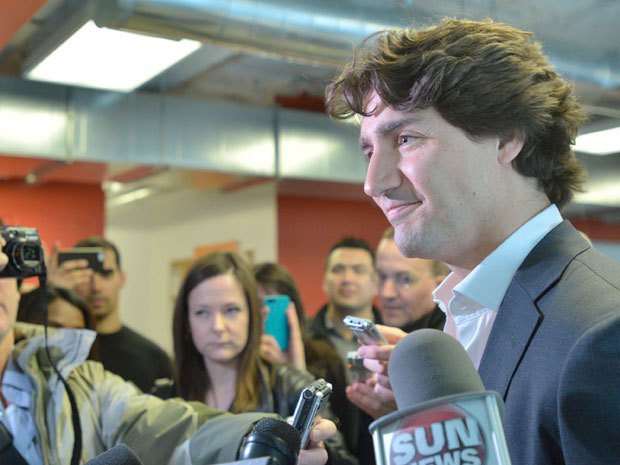Justin Trudeau portrayed the Liberal party Wednesday as the pragmatic alternative to Conservative and NDP opponents he said occupy the “fringes” of Canadian politics.
The MP widely expected to capture the Liberal leadership next month was short on policy details during a business-club appearance in downtown Toronto.
He tried, however, to etch out a clear role for the party in the wake of the 2011 election, which gave the Harper Conservatives their first majority, elevated the surging New Democrats to official-opposition status — and decimated the Liberals.
He depicted himself as a positive, non-ideological choice at a time when he said most Canadians are fed up with partisan warring and “polarizing” issues.
Many Liberals are worried that Prime Minister Stephen Harper and the Conservatives will launch a negative ad campaign against whoever captures the party’s leadership, Mr. Trudeau told the Empire Club luncheon. He said such tactics are often effective but ultimately alienate voters, and promised to “go positive” if he wins the job.
The candidate took pains to also single out the New Democrats for criticism. He said Thomas Mulcair, the NDP leader, has followed Mr. Harper’s lead by “choosing to divide” in his politics, criticizing the West’s “resource-based economy” and “playing dangerous games with soft nationalists and sovereigntists” in Quebec.
The Liberals, on the other hand, are a “pragmatic” party interested in what works, not bound by any particular ideology, Mr. Trudeau said.
“The Conservatives and NDP have been able to wrap up the political fringes,” he charged “They [voters] are all wrapped up on the hard left and hard right.”
The Liberals wound up with 34 seats, to the Conservatives’ 166 and the NDP’s 103 in the last election, although some polls recently have suggested Mr. Trudeau could lead his party back into power.
Mr. Mulcair has drawn fire from Western politicians for criticizing the proposed XL pipeline that would take oil from Alberta to the U.S., but has indicated recently he supports oil sands development. On Quebec, the NDP have favoured changing federal laws to allow the province to separate based merely on a 50%-plus-one referendum result, rather than a healthier majority.
Mr. Trudeau earned two standing ovations at Wednesday’s event, and an enthusiastic introduction from Joseph Mancinelli, Canadian head of the Labourers’ International Union of North America, who introduced the speaker as the “future prime minister.”
But the audience, typically dominated at the club’s gatherings by denizens of the nearby financial district, seemed stacked with Liberals, including former Ontario premier David Peterson and Pierre Pettigrew, the former federal cabinet minister who once held Mr. Trudeau’s Papineau riding.
The candidate answered generally non-confrontational questions posed by John Cruickshank, publisher of the Toronto Star; Mr. Trudeau noted he supported the Star’s governing Atkinson principles.
Trudeau touts Liberals as ‘pragmatic’ alternative to parties occupying ‘the fringes’ of Canadians politics






















Laissez un commentaire Votre adresse courriel ne sera pas publiée.
Veuillez vous connecter afin de laisser un commentaire.
Aucun commentaire trouvé